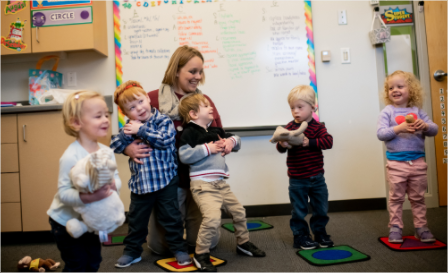Family Matters
As a child’s first and most important teachers, we know true collaboration with parents and family members is the only way to help each child reach his or her potential. As a result, families are an integral part of our programs.
In the birth-to-three program, our early interventionists work with the family members in their home or facilitate parent child interactions remotely through teletherapy. These sessions provide families with information about hearing loss, hearing technology, and empower parents to bond with and nurture their child in the early phases of development, fostering early listening and communication skills. Extended family members are always welcome to participate.
In our school program, families continue to be involved through monthly meetings, classroom and therapy observations, and family participation activities. Parent education sessions are conducted on a variety of topics including social/play skills, behavior management, development and how to confidently advocate for their child in medical, educational and social settings.
Parent-to-parent support has the potential to help parents find inspiration and hope from meeting families of older children with established communication skills who have already transitioned back to their neighborhood schools. Additionally, interactions with other parents of young children who are DHH helps create a support network of parents facing similar journeys. The school’s Parent Teacher Organization is working to establish opportunities for parents to connect in this way.
